How Negative Reviews Impact Your Business (and How to Fix Them Fast)
The 8 Best Property Management Marketing Techniques

The 8 Best Property Management Marketing Techniques
Obtaining new residents and resigning existing ones are critical to property management companies’ (PMCs) wellbeing. Today, PMCs obtain new and retain current residents through property management marketing.
We at SOCi help over 200 PMCs and more than 22,500 individual properties with their digital marketing efforts. In this blog, we’ll explain a few of the best property management marketing techniques and how to strategically implement them to get noticed online and secure new residents.
1. Have a Traditional SEO Strategy
Search engine optimization (SEO) is one of the most important aspects of digital marketing. For PMCs, traditional SEO requires optimizing your website for search engines so people can find your PMC and individual properties when searching online.
The more visibility you have on the search engine results page (SERP), the more likely potential residents will visit your website and consider living at one of your properties.
Below are the most common and effective traditional SEO tactics:
- Conduct keyword research and target specific keywords on your website
- Publish helpful or interactive content about your local areas, the industry, and general rental tips
- Gain natural backlinks by creating superior and useful content or through guest posting practices
- Add internal links between important pages and blog posts
2. Implement Local SEO Tactics
PMCs also need to focus on local SEO, sometimes called local search. Local SEO optimizes your online presence so that your properties appear for relevant local searches.
For local searches, you want to appear in the two areas of the SERP: local organic search and the local pack/finder. Let’s discuss how to rank in local organic search first.
Local Organic Search
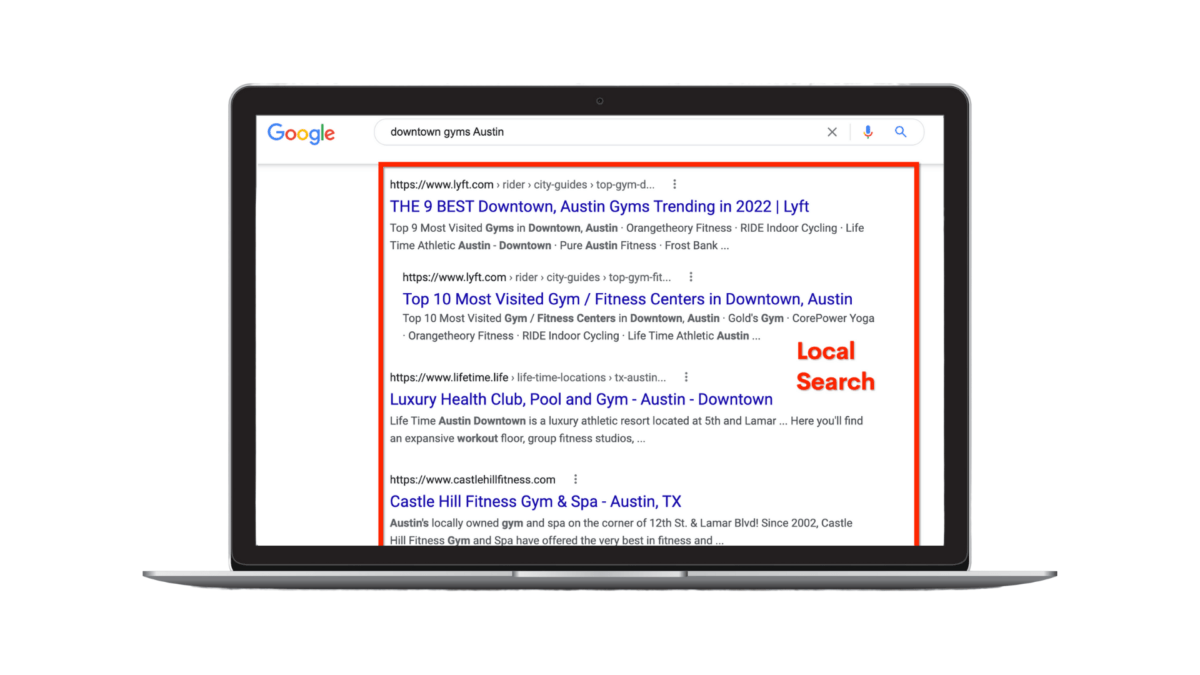
According to local SEO experts, the main ranking factor for local organic search is on-page SEO. On-page SEO are things you control that help your local properties rank in the organic search results. These include:
- Keywords in your website, URLs, title tags, and meta descriptions
- Clean URL structures that have a systematized structure and include targeted keywords
- Image alt text that describes images and videos to visually impaired users
- Meta descriptions that are 50-160 characters long and act as a hook to entice the reader
- Internal links connecting pages on your website with
As a PMC, you likely have individual websites for each of your properties. Implementing these on-page SEO tactics will help your website rank higher in local organic search. Note that you can apply these on-page SEO tactics to your traditional SEO strategy.
Now, onto ranking in the Local Finder/Pack.
Local Finder/Pack Search
Ranking in the Local Pack, also known as the Google 3-Pack, is all about claiming and optimizing your local listings.
A local listing is an online mention of your business that includes key business information like name, address, and phone number (NAP).
Since Google owns 92 percent of the search engine market share worldwide, the most important local listing is your Google Business Profile (GBP). When Google Search and Maps users enter relevant terms, your GBP has the opportunity to appear in the Google 3-Pack or Finder.
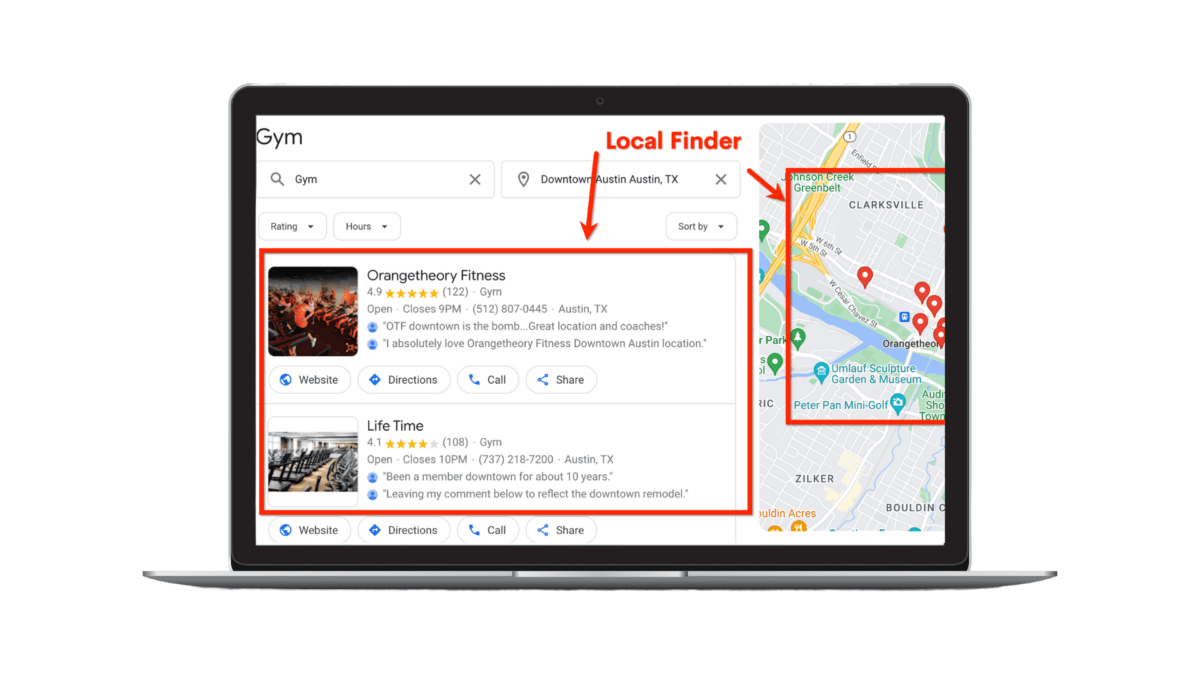
Having your properties rank well in the Google 3-Pack and Finder is extremely important. Our research found that businesses in the 3-Pack receive 126 percent more traffic and 93 percent more actions (calls, website clicks, and driving directions) than businesses ranked 4-10.
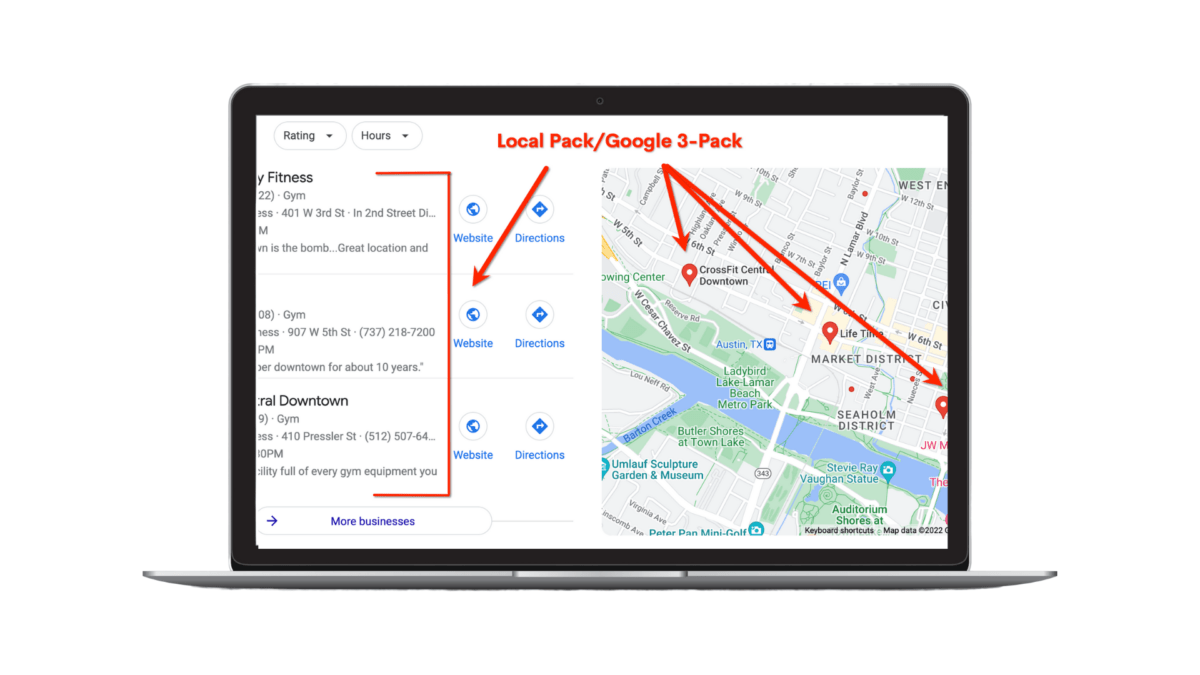
Here are a few key strategies to help your properties rank in the Local Pack and Finder:
- Select a primary GBP category.
- We recommend selecting: apartment building, apartment complex, or apartment rental agency.
- Choose secondary GBP categories
- Select the other two categories listed above
- Encourage residents to leave reviews and ratings
- Fill out all business information in each GBP
- Include keywords in your GBP title
For further insight on improving your PMC’s local SEO efforts, download our Top 10 Things You Should Be Doing in Local SEO NOW Guide.
3. Create Helpful Content
We briefly mentioned this earlier, but it’s worth creating intriguing and helpful content for users. This type of content ranks well on the SERP and gets organic traffic. It can also improve your brand reputation and help convert potential residents.
In general, your content should be:
- High quality
- Helpful and informative
- Original
- Recent up-to-date information and data
Here are a few examples of content PMCs can produce that current and potential residents might find helpful:
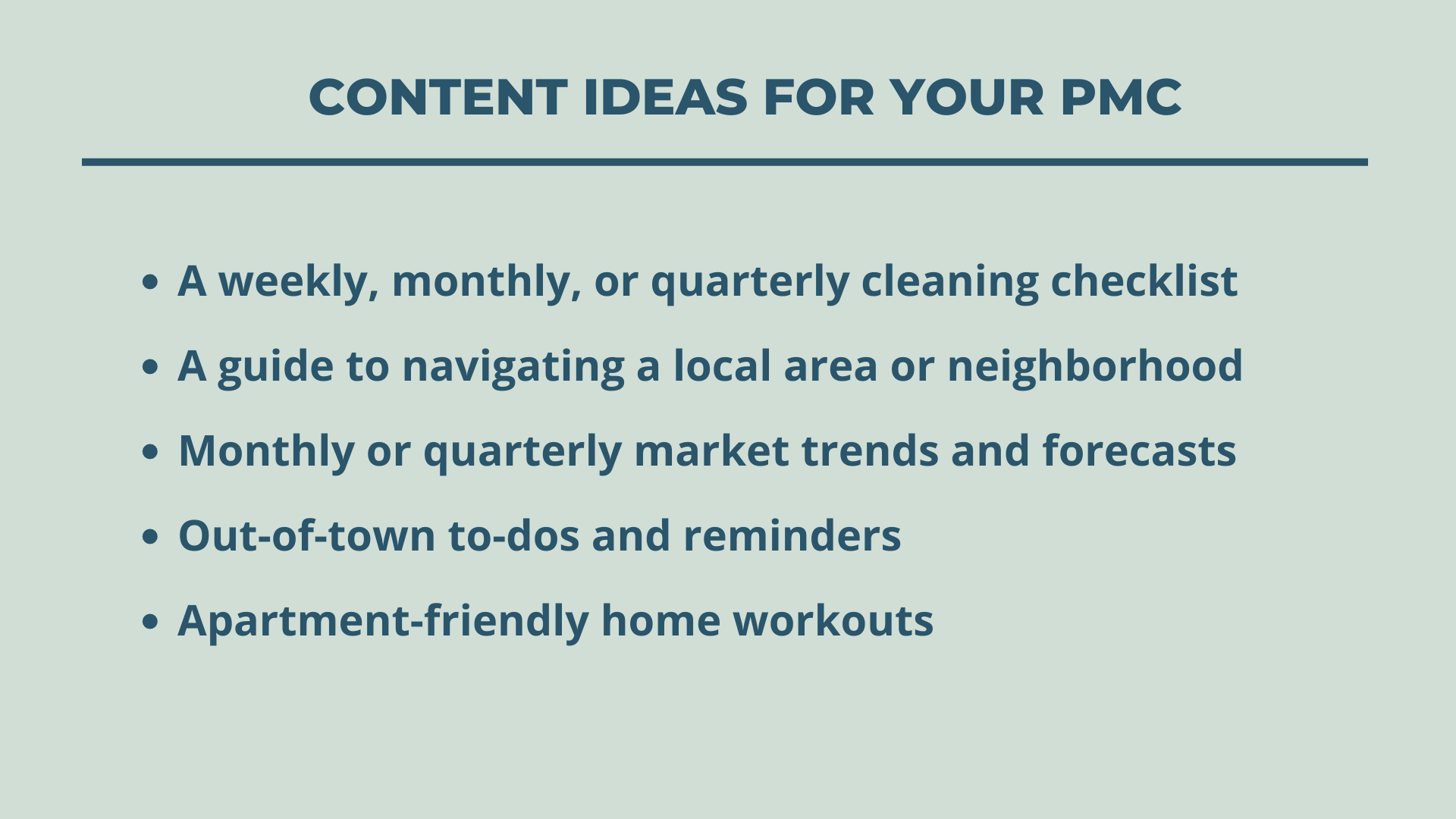
4. Be Active on Social Media
Being active on social media is a must in today’s digital marketing world. Nearly 8 in 10 apartment seekers look at social media before choosing their next rental. If you’re not actively posting and engaging with social media users, you could lose potential residents to competitors.
We’ve found that localized content receives 12x the engagement rate as more general or “non-localized” content. This holds especially true for PMCs. Potential residents want to see local content from apartment complexes they’re considering. This content can help build trust and create excitement between potential residents and properties.
Here are a few social media content ideas:
- Upcoming community events, giveaways, and activities
- Distance to popular shopping and dining areas
- Current residents’ reviews
- Amenity highlights
- Employee shout outs
- Nonprofit partnerships or fundraising events
- Upcoming neighborhood events
To save time, you can repurpose content from your blogs and turn them into enticing social media posts with UTM tracking links back to the blog post.
Download The Localized Social Content Guide for Student Housing, Senior Living, and Multifamily for additional details on localized social best practices for PMCs. The guide also differentiates local social tactics for multifamily, student housing, and senior living properties.
5. Deploy Search Ads
So far, we’ve discussed organic marketing efforts, which help you naturally generate traffic to your local properties. Now, we’ll delve into paid marketing strategies.
The two paid advertisements that work best in property management marketing are search advertising and social advertising. Let’s discuss search ads first.
Search advertising involves placing digital advertisements so they appear at the top of the search engine results page. Typically, your PMC will pay a small fee each time someone clicks on one of your search ads.
You can run search ads on any search engine like Google, Bing, or Yahoo. We recommend using Google Ads since the vast majority of people use Google.
Depending on the keyword, the first three results in Google Search or Maps are often from Google Ads. See the example below for the keyword “Chicago apartments.”
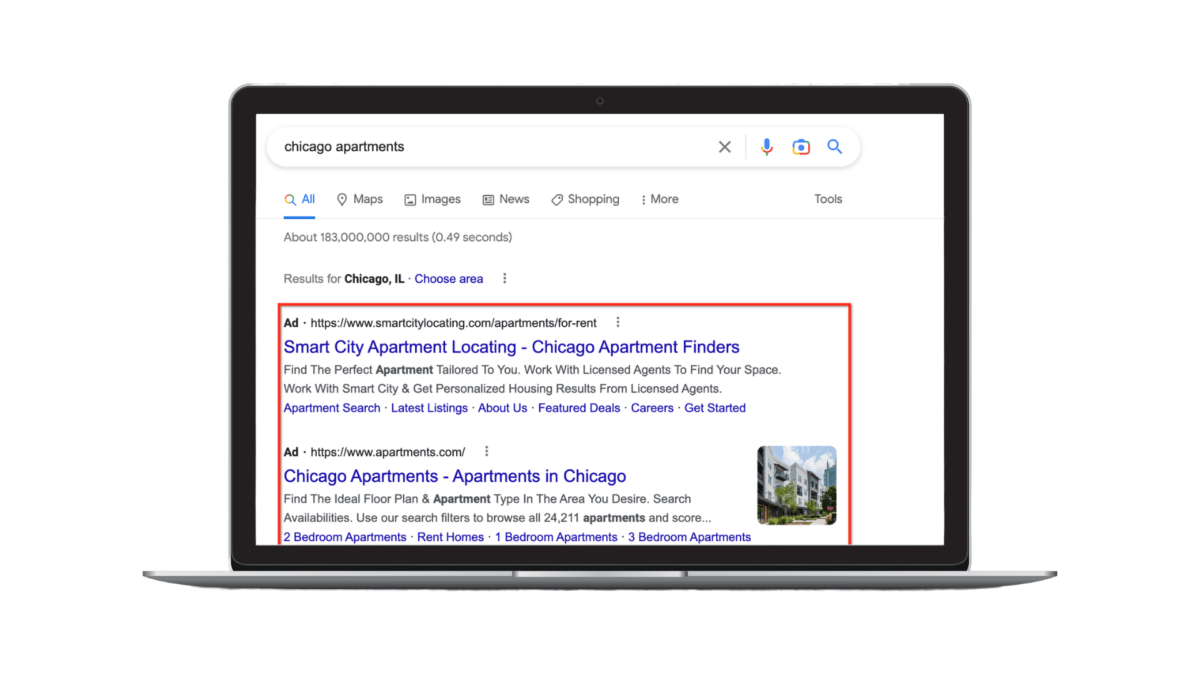
Search ads are a great way to help ensure immediate placement at the top of the SERP or Google Maps for targeted keywords. If done correctly, they can result in a high ROI.
Now, onto social ads.
6. Distribute Social Ads
Social ads are paid advertisements you run to a target audience on different social media platforms. You can run social ads on any major social platform, including Facebook, Instagram, LinkedIn, Twitter, and TikTok.
People are on social media a lot. According to one study, people spend an average of two hours and 27 minutes daily on social media. So, they’re likely to see your social ads.
Another benefit of social ads is how much you can customize and target a specific audience. Most major social platforms allow you to target by:
- Location (geotargeting and geofencing)
- Age
- Gender
- Interests
- Online behavior
These social platforms also have in-depth analytics that allow you to measure ad performance and make adjustments for better targeting. Furthermore, social ads are great for local social use since you can target by location, age range, and interests.
For instance, the content and audience for a student housing advertisement will be completely different than a senior living one targeting seniors and their families.
Read our blog post on social advertising for more social advertising best practices and details on each social platform’s targeting capabilities.
7. Improve Your Online Reputation Management
According to one survey, 96 percent of people consider online reviews and ratings when searching for a rental property. Moreover, nearly two in three people look at online ratings and reviews at the beginning of their apartment search.
Your PMC needs to create a strong online reputation management (ORM) strategy to stand out from competitors. ORM requires that you take control of what’s being said about your properties and ensure potential residents find positive information online about your properties.
A comprehensive ORM strategy also includes generating reviews for your properties and quickly responding to the reviews.
Here are some benefits of implementing an ORM strategy:
- Increase your GBP rankings
- GBPs ranked number one average 404 reviews, and those ranked three through five average 280.
- Improve conversion rates
- Every tenth of a star increase on a GBP improves conversion by 4.4 percent.
- Outpace competitors who are slow to respond to reviews
- PMCs, on average, take 42 days to respond to a review on Google and nearly 14 days on Yelp.
The first step in implementing an ORM strategy is for your PMC to decide who will monitor and respond to reviews. This responsibility can fall on a team at the corporate office, local property managers/team members, or a mixture of both.
Next, it’s essential that you properly train anyone responding to reviews. You can do this through examples and templated responses. Download The Online Reputation Management Guide for Property Management Companies to learn how your PMC can correctly respond to positive and negative reviews.
8. Utilize a Multi-Location Marketing Platform
These property management marketing techniques can take time and effort to implement and maintain properly. Partnering with a marketing platform built for multi-location marketing can help!
SOCi is the marketing platform for PMCs with all of the tools you need to run a successful digital marketing strategy under a single login. SOCi Listings and Local Pages can help you manage your local SEO and get your GBP and other listings ranking high on search engines.
SOCi Social allows corporate and local teams to access content libraries. These libraries allow you to publish intriguing and helpful content across multiple properties on major social platforms.
Furthermore, SOCi Reviews helps you track and respond to reviews on all major review sites. Property managers or corporate teams can also maintain review oversight through approval workflows.
All of SOCi’s products have in-depth analytics capabilities. These analytics and dashboards give critical insight into what’s working at each property and which adjustments you need to make. For more details on how SOCi can support your property management marketing efforts, request a demo today!








